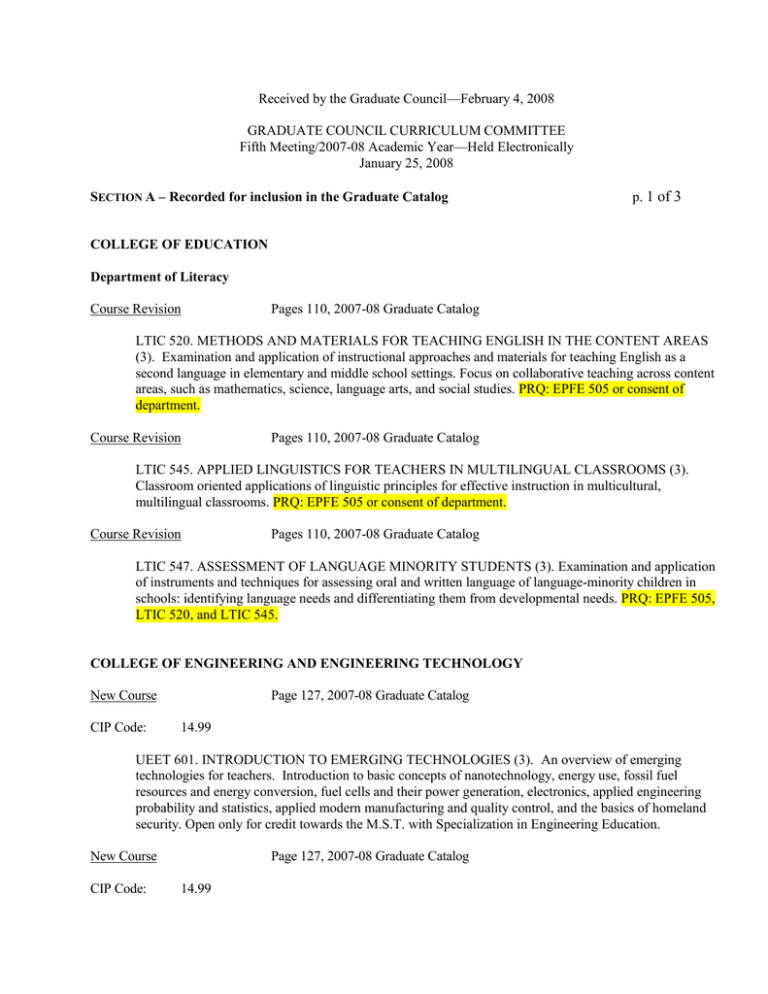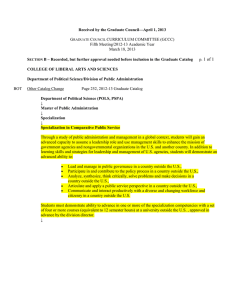Received by the Graduate Council—February 4, 2008 GRADUATE COUNCIL CURRICULUM
advertisement

Received by the Graduate Council—February 4, 2008 GRADUATE COUNCIL CURRICULUM COMMITTEE Fifth Meeting/2007-08 Academic Year—Held Electronically January 25, 2008 SECTION A – Recorded for inclusion in the Graduate Catalog p. 1 of 3 COLLEGE OF EDUCATION Department of Literacy Course Revision Pages 110, 2007-08 Graduate Catalog LTIC 520. METHODS AND MATERIALS FOR TEACHING ENGLISH IN THE CONTENT AREAS (3). Examination and application of instructional approaches and materials for teaching English as a second language in elementary and middle school settings. Focus on collaborative teaching across content areas, such as mathematics, science, language arts, and social studies. PRQ: EPFE 505 or consent of department. Course Revision Pages 110, 2007-08 Graduate Catalog LTIC 545. APPLIED LINGUISTICS FOR TEACHERS IN MULTILINGUAL CLASSROOMS (3). Classroom oriented applications of linguistic principles for effective instruction in multicultural, multilingual classrooms. PRQ: EPFE 505 or consent of department. Course Revision Pages 110, 2007-08 Graduate Catalog LTIC 547. ASSESSMENT OF LANGUAGE MINORITY STUDENTS (3). Examination and application of instruments and techniques for assessing oral and written language of language-minority children in schools: identifying language needs and differentiating them from developmental needs. PRQ: EPFE 505, LTIC 520, and LTIC 545. COLLEGE OF ENGINEERING AND ENGINEERING TECHNOLOGY New Course CIP Code: Page 127, 2007-08 Graduate Catalog 14.99 UEET 601. INTRODUCTION TO EMERGING TECHNOLOGIES (3). An overview of emerging technologies for teachers. Introduction to basic concepts of nanotechnology, energy use, fossil fuel resources and energy conversion, fuel cells and their power generation, electronics, applied engineering probability and statistics, applied modern manufacturing and quality control, and the basics of homeland security. Open only for credit towards the M.S.T. with Specialization in Engineering Education. New Course CIP Code: Page 127, 2007-08 Graduate Catalog 14.99 Received by the Graduate Council—February 4, 2008 GRADUATE COUNCIL CURRICULUM COMMITTEE Fifth Meeting/2007-08 Academic Year—Held Electronically January 25, 2008 SECTION A – Recorded for inclusion in the Graduate Catalog p. 2 of 3 UEET 602. NANOTECHNOLOGY AND APPLICATIONS (3). Introduction to the basic concepts of nanotechnology for educators with a focus on theory of nanotechnology, history of nanotechnology, microelectronics and MEMS, and simple experiments to demonstrate the principles of nanotech. Special emphasis is placed on modeling and use of instructional methods and best practices appropriate for delivery of pedagogical content. Open only for credit towards the M.S.T. with Specialization in Engineering Education. New Course CIP Code: Page 127, 2007-08 Graduate Catalog 14.99 UEET 603. INTRODUCTION TO ENERGY ENGINEERING (3). Overview of energy use, fossil fuel resources and energy conversion for teachers. Topics include solar energy principles, solar collector, photovoltaic cells and applications; wind energy and wind turbines; nuclear energy principles, nuclear reactors, and power generation; bio-mass and energy conversion; and hydrogen energy, storage, and transportation. Overview of fuel cell, fuel cell types, and applications. Special emphasis on modeling and use of instructional methods and best practices appropriate for delivery of pedagogical content. Open only for credit towards the M.S.T. with Specialization in Engineering Education. New Course CIP Code: Page 127, 2007-08 Graduate Catalog 14.99 UEET 604. INTRODUCTION TO FUEL CELL AND FUEL CELL POWER GENERATION (3). Introduction of the basics of fuel cell power generation for teachers. Topics include: introduction to fuel cell; classification, types, and operations of fuel cell; energy conversion process in fuel cell; fuel cell characterization; thermodynamics of electrochemical fuel cell, major components, and operation; irreversibilities, voltage losses, and performance characteristics; fuel cell analysis and design; fuels and fuel processing; thermal and water management; and fuel cell power electronics and power conditioning. Special emphasis on modeling and use of instructional methods and best practices appropriate for delivery of pedagogical content. Open only for credit towards the M.S.T. with Specialization in Engineering Education. PRQ: UEET 603 or consent of the college. New Course CIP Code: Page 127, 2007-08 Graduate Catalog 14.99 UEET 605. NANOELECTRONICS AND APPLICATIONS (3). Introduction to the basic concepts of nanoelectronics for teachers. Use of theory and experiments to demonstrate the principles of nanoelectronics and nanodevices. Open only for credit towards the M.S.T. with Specialization in Engineering Education. Received by the Graduate Council—February 4, 2008 GRADUATE COUNCIL CURRICULUM COMMITTEE Fifth Meeting/2007-08 Academic Year—Held Electronically January 25, 2008 SECTION A – Recorded for inclusion in the Graduate Catalog New Course CIP Code: p. 3 of 3 Page 127, 2007-08 Graduate Catalog 14.99 UEET 606. APPLIED MODERN MANUFACTURING AND QUALITY CONTROL (3). Study of the elements of the entire manufacturing process, including the cost, productivity (throughput), and quality control arenas. Exploration of the relationship between cost, throughput, and quality. Study of optimization principles and the application to manufacturing. The content as well as the pedagogy will be addressed. Open only for credit towards the M.S.T. with Specialization in Engineering Education. New Course CIP Code: Page 127, 2007-08 Graduate Catalog 14.99 UEET 607. INTERNSHIP (3). Provides experiences at industrial sites or research laboratories in emerging technologies such as nanotechnology, fuel cell research, modern manufacturing and quality control, and homeland security. Students are required to spend 20-40 hours per week at practice sites. Open only for credit towards the M.S.T. with Specialization in Engineering Education. New Course CIP Code: Page 127, 2007-08 Graduate Catalog 14.99 UEET 608. MASTER’S PROJECT (3). Focuses on a relevant subject area of particular interest to the student in the areas of emerging technologies such as nanotechnology, fuel cell research, modern manufacturing and quality control, and homeland security. Student must have completed more than 27 semester hours of the M.S.T. program or be in the final semester of the program. Open only for credit towards the M.S.T. with Specialization in Engineering Education.

